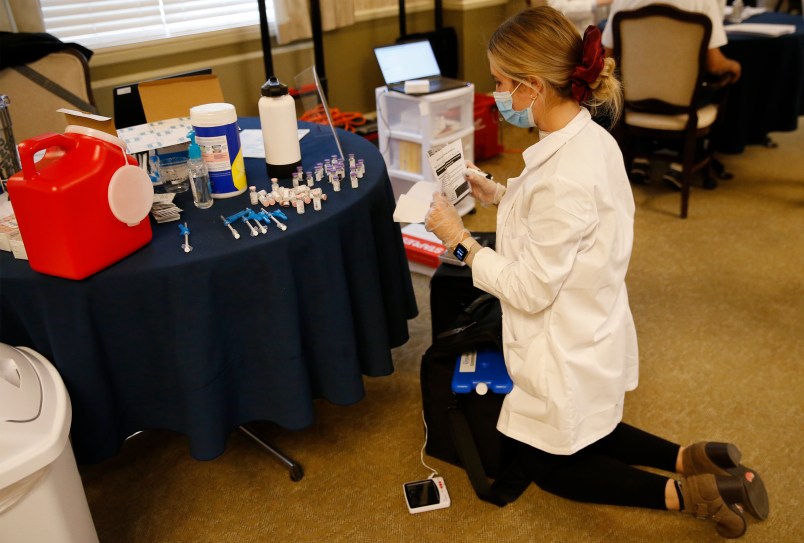At least two states are opting out of the federal partnership with pharmacies to distribute vaccines to nursing homes, one of the only areas in which the Trump administration used the power of the federal government to administer COVID-19 vaccines.
Florida and Oklahoma have moved over the past week from relying on a federal partnership with CVS and Walgreens to vaccinate the staff and residents of long-term care facilities to instead find other ways of finishing the inoculation program.
And, in both cases, top state officials blamed the chain pharmacies for going too slowly.
States around the country are complaining that federal supplies of COVID-19 vaccine aren’t nearly enough to meet demand, even among the relatively narrow categories of people for whom the shot is available.
But the federal pharmacy partnership — launched by the Trump administration in November 2020 — has gone slowly enough that, in some states, officials have indicated that the only doses outstanding are those being administered under the pharmacy program.
In Oklahoma, Deputy Heath Commissioner Keith Reed said that “The program is not moving as fast as we would like it to move.”
“If those are going to sit in a freezer and they’re not going to get to Oklahomans for several weeks down the road, we need to redirect that,” Reed said.
Florida Gov. Ron DeSantis (R) said that the state had decided to contract with another firm — CDR Health — because “time is of the essence.”
For states already facing budget crunches and understaffed public health departments due to the pandemic and a longstanding lack of funding, the decision to move away from the pharmacy partnership — which the federal government paid for — illustrates the frustration with the effort that has bubbled up around the country.
CVS and Walgreens, in separate comments to TPM, defended their performance. Both chains completed giving all recipients in long-term care facilities with which they were still contracted the first dose on Monday.
“Criticism that our long-term care vaccination program is slow or behind schedule in the state of Oklahoma is misinformed and not accurate,” CVS said in a statement.
The chain pharmacy added that last-minute fluctuations in the amount of vaccine allocated — a problem originating from the federal distribution network set up during the Trump administration — made it more difficult to plan how much vaccine should go to each long-term care facility.
A Walgreens spokesperson said that Oklahoma had “merely paused” in giving the company additional doses to use, and said that Florida had “re-allocated a small number of facilities contracted with Walgreens.”
“As the Governor mentioned yesterday, it is a team effort and we are proud to be part of the team,” the statement read.
Delays in the pharmacy partnership have caused consternation around the country, and fascination with the case of West Virginia, which eschewed the program in favor of using its own network of community pharmacies.
Thomas Dobbs, an official with the Mississippi Department of Health CHECK, told KHN that the program had been a “fiasco” in his state.
Other states have taken similar steps, albeit on a smaller scale or for different reasons. In Maine, state officials took 975 doses away from Walgreens and 500 from CVS.
In Pennsylvania, the state realized that it would need an additional contract to vaccinate other facilities that the federal plan didn’t cover.
It hired Rite-Aid to vaccinate long-term care facilities that didn’t fit into the plan, like psychiatric hospitals and group homes for people with disabilities.







Can anyone explain to me how my 50 year old friend in Fort Worth is getting her first vaccine shot today. Empty parking lot, no lines. Unlike the pics she sends me of the food lines.
My sisters at The Villages FL have received their first shot.
Gee, I wonder how much of this is related to the “government overreach of the Biden administration!”, or just an attempt to make the Biden administration look bad for the slow vaccine rollout. If the pharmacies have finished their vaccination program, it’s really difficult to say that they hadn’t done anything…and if the complaint is that they haven’t moved on to the next group of people that’s because the Trump administration apparently didn’t set up the contracts for them to do so.
This is just a first shot from conservatives to try to blame the Biden administration for their “failure” to vaccinate Americans. It’s all a political play to try to paper over the failure of the Trump administration to plan for vaccination of all Americans…in any other administration the new team would have been in on the planning and there would have been a smooth handoff. This will continue, and it wouldn’t surprise me for Republican states to refuse federal assistance and interfere in the process while blaming the Biden administration for “failing”…that’s really just how cynical they have become.
This is what Jared called “Operation Warp Speed”.
Not surprising the previous administration is continuing to screw things up well into the future. FL is a mess though and DeSantis does’t get to blame it on anyone but himself. I have parents in their 80s that live in FL and they’ve been trying to get vaccinated for weeks, but it’s a first come first serve free for all signing up and they are technologically competent and can drive, I can’t imagine what it’s like for people who are not online, not familiar with getting online or finding health information, can’t drive to a vaccine location, or don’t stay up on when and where they are able to get vaccinated. It’s a complete mess there.